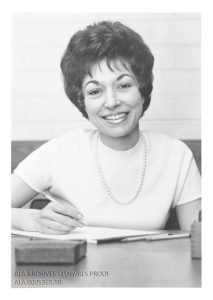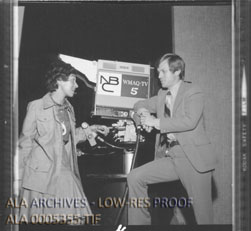This blog post is part of a series exploring the important events and people in ALA’s history for the celebration of the 150th anniversary of ALA in 2026.
Almost 60 years ago, the Intellectual Freedom Committee (IFC) of the American Library Association needed a partner in the fight for intellectual freedom. The 1960s brought concerns about censorship, freedom of the press, the freedom to read – and the impact on librarians who sought to uphold the values within the Library Bill of Rights and the Freedom to Read Statement. The ALA’s Office for Intellectual Freedom (OIF) was the solution, providing support and education on intellectual freedom to librarians and the public.[1] Little did they know how vital the OIF would become to the fight against book challenges and censorship and to the support of librarianship and the freedom to read everywhere.

In January 1965, at the ALA Midwinter Meeting, the Intellectual Freedom Committee proposed the initial idea for the Office for Intellectual Freedom, after a 2-day conference dedicated to the issue.[2] The Council at the following Annual Conference approved the recommendation to create an office devoted to furthering the ALA’s intellectual freedom activities and upholding the Library Bill of Rights.[3] Due to funding issues, the OIF wasn’t opened until December 1, 1967.[4] The extra time allowed for a clear set of duties and functions to be established for the office and for a strong, visionary first Director to be found.
The original proposal envisioned a full-time legal counsel working in the OIF to provide services to libraries on all levels in legal issues of intellectual freedom and censorship.[5] While the actual initial staffing only included the director and her secretary, this legal support service did not disappear; rather, it became one of the core functions of the office. Other primary objectives included providing advisory services and disseminating information on intellectual freedom issues, liaising with the IFC and other related organizations, and assisting with tenure investigations related to intellectual freedom.[6] The director assumed a long list of responsibilities. Chiefly, she would be “responsible for developing an information/education program to bring recognition to the ALA intellectual freedom position.” This objective would mainly be achieved through publications like the Newsletter on Intellectual Freedom and a monthly OIF Memorandum, speeches, workshops, and networking.[7] Overall, the OIF functioned as the administrative arm of the IFC, serving as secretariat for the committee, assisting with policy development, and creating activities and publications in line with the committee’s goals.[8]
It was the first director of the OIF, however, that truly created the vision for what the intellectual freedom arm of the ALA is today. The director wasn’t even originally intended to be a librarian – the job was open to any qualified candidate with a strong interest in the area, according to a job ad in the ALA Bulletin.[9]

But Judith Krug, originally a reference librarian and cataloger in Chicago, before becoming a research analyst for the ALA, was chosen to head the new unit.[10] At only 27 years old, Krug changed the landscape of intellectual freedom: she served as executive director of the Freedom to Read Foundation from its inception in 1969, published numerous educational materials on intellectual freedom, fielded thousands (if not tens of thousands) of requests for consultation on censorship issues, and helped to establish ALA’s Banned Books Week. The early days of the OIF involved sharing information and assisting in policy creation on censorship issues, such as book bans. In 1967, the Presidential Commission on Obscenity and Pornography was created to evaluate the effect of obscene and pornographic materials on the public and provide recommendations on the regulation of such materials.[12] The OIF, once established, was able to disseminate information about this commission to librarians. They connected with state library associations to urge bills on censorship of materials deemed obscene to be tabled in state legislatures, before the commission completed its study. Judith Krug wrote about similar bills and the ALA’s position on censorship in the monthly Intellectual Freedom column in the ALA Bulletin, providing current intellectual freedom news and resources to librarians across the country.[13]
By being a staunch First Amendment supporter and organizer, Krug developed the OIF’s capabilities for over 40 years as its director until her death in 2009.[14] Krug saw her office as the link between the policies created by the IFC and implementation in libraries across the country. She formed connections with state library association intellectual freedom committees and communicated with them monthly through the OIF Memorandum, providing news on legislation and judicial decisions, materials for new programs, and information to aid in the defense of intellectual freedom.[15] The OIF, under Judith Krug, grew from a small 2-person endeavor to a leading intellectual freedom program in just a couple of years.
—
All sources are located in the ALA Archives, Office for Intellectual Freedom Subject File, 1961-, Record Series 6/1/6, unless otherwise noted.
[1] “Office for Intellectual Freedom,” American Library Association, June 9, 2008, https://www.ala.org/aboutala/offices/oif.
[2] “Highlights of the Midwinter Meeting,” ALA Bulletin 59, no. 3 (1965): 193. http://www.jstor.org/stable/25697107.
[3] “Highlights of the Detroit Conference,” ALA Bulletin 59, no. 7 (1965): 624. http://www.jstor.org/stable/25697243.
[4] David H. Clift to William Leslie Smith, Jr., July 26, 1966, RS 6/1/6-19, Folder: OIF Background, 1965-66.
[5] “Recommendations from the Intellectual Freedom Committee,” January 26, 1965, RS 6/1/6-19, Folder: OIF Historical Documents, 1964-86.
[6] “Functions of Intellectual Freedom Office and Duties of its Director,” April 14, 1966, RS 6/1/6-19, Folder: OIF Background, 1965-66.
[7] Judith Fingeret Krug, resume, n.d., RS 6/1/6-19, Folder: Biographical Information, Director Judith Krug, 1985-97.
[8] Judith F. Krug and Robert P. Doyle to State Intellectual Freedom Committees, memorandum, July 1983, RS 6/1/6-19, Folder: OIF Scope of the Office – Present & Future, 1970-83.
[9] Ervin J. Gaines, “Intellectual Freedom.” ALA Bulletin 60, no. 3 (1966): 230. http://www.jstor.org/stable/25697371.
[10] Krug, resume.
[11] James LaRue and Eleanor Diaz, “50 Years of Intellectual Freedom,” American Libraries, November 1, 2017, https://americanlibrariesmagazine.org/2017/11/01/50-years-office-intellectual-freedom/.
[12] Judith F. Krug, “Intellectual Freedom.” ALA Bulletin 62, no. 4 (1968): 365–66. http://www.jstor.org/stable/25697830.
[13] Judith F. Krug, “Intellectual Freedom.” ALA Bulletin 62, no. 5 (1968): 481–84. http://www.jstor.org/stable/25697859.
[14] American Library Association, “Judith Krug, librarian, tireless advocate for First Amendment rights, dies,” news release, April 13, 2009, https://www.ala.org/news/news/pressreleases2009/april2009/oifkrug.
[15] Judith F. Krug and James A. Harvey, “Intellectual Freedom: The Spectrum,” American Libraries 2, no. 4 (1971): 352-54. RS 6/1/6-19, Folder: OIF Scope of the Office – Present & Future, 1970-83.